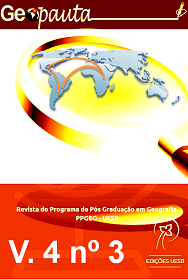The house as a space of resistance: Communities of care for a anti-racist feminist politics
DOI:
https://doi.org/10.22481/rg.v4i3.7486Keywords:
Covid-19. Decolonial feminisms; Anti-racist politicsAbstract
In the context of a pandemic, the house is transformed into the world. In the face of growing apartheidism, colonialist and racial injustices that persist, the feminist anti-racist politics that ancestrally fought from home is the source of inspiration for the current resistance. Afrotransatlantic stories shine in the "poetics of the sea." As metaphors, the idea of the Caribbean labyrinth facing the Mediterranean could deactivate neocolonial artillery. The question about what experiences occurred in the collective body affected by our post-colonial era of the pandemic opens new reflections citing the stage writing of Audre Lorde: “The tools of the teacher will never dismantle the house of love”, how to build a group power of minority sororities that could tear down the house of love?
Downloads
References
Bidaseca, Karina et al. La articulación entre raza, género y clase a partir de Aníbal Quijano. Diálogos interdisciplinarios y lecturas desde el feminismo. Papeles de trabajo, IDAES-UNSAM, 10, (18), 2016.
Bidaseca, K. (2018). La revolución será feminista o no será: la piel del arte feminista descolonial. Buenos Aires: Prometeo,
Bidaseca, K. (2020) “La casa, el mundo. Políticas feministas antirracistas y comunidades de cuidado”, en el Boletín Nº 3 Ancestralidad, antirracismo y actualidad. La pandemia racializada. Bs As: CLACSO, julio 2020.file:///Users/karinabidaseca/Downloads/ V3_Ancestralidad_ antirracismo_actualidades_N3_compressed.pdf/ https://www.clacso.org/boletin-3-ancestralidad-antirracismo-y-actualidades/
Bidaseca, K. (2020) “Territorializar las memorias, abrazar los mundos. Ana Mendieta, arte feminista situado”. En Revista CDM. Arquivos CMD - Cultura Memória e Desenvolvimento. Dossiê bilíngue “Gênero, Memória e Cultura” / “Género, Memória y Cultura”.
Bhabha, H. Conversation between John Comaroff and Homi Bhabha. In: Goldberg, D; Auayso, A. (Orgs.). Relocating postcolonialism. New York: Blackwell, 2002. p. 17-36.
Campoalegre Septien, R. Y Bidaseca, K. (2017) (Coord.) Más allá del decenio de los pueblos afrodescendientes. (Buenos Aires, CLACSO).
Carneiro, S. [2002]. “Ennegrecer el feminismo”. Conferencia presentada en Durban, 2002. Disponible en http://www.penelopes.org/Espagnol/xarticle.php3?id_article=24
Gonzalez, L.; Haselbag, C. [1982]. Lugar de negro. Río de Janeiro: Marco Zeero, 1982Fanon Frantz. (1970) ¡Escucha, blanco! Barcelona (Ed. Nova Terra).
Hooks, B. (1990) Yearning. Race, gender and cultural politics. (Boston: South End Press).
Lippard, L.R.; Lovarlt, A.; Mendieta, C.R.; Mosquera, G.(2019) Ana Mendieta: La Tierra Habla (the Earth Speaks). New York, Galerie Lelong
Lorde, A. (1978) Uses of the Erotic: The Erotic as Power. En Sister Outsider. Ten Speed Press.
Lorde, A. [1979] Los diarios del cáncer. - 1a ed. Traducido por: Gabriela Adelstein. Rosario: Hipólita Ediciones, 2008.
Lorde, A. (1988) “La casa del amo no se desarma con las herramientas del amo”, en Moraga, Cherríe; Castillo, Ana (ed.) Esta puente mi espalda. Voces de mujeres tercermundistas en los Estados UnidoS (San Francisco: ISM Press).
Lugones, M. (2008) Colonialidad y género, Tabua Rasa, nº 9, Bogotá
Quijano, A. (2003) Colonialidad del poder, eurocentrismo y América Latina. En: Lander (comp.). La Colonialidad del Saber: eurocentrismo y ciencias sociales. Perspectivas latinoamericanas. Buenos Aires: CLACSO,
Santos, G. C. A. (2012) Somos todas rainhas. São Paulo: Associação Frida Kahlo,
Viana, Elizabeth (2006). «Relaçoes raciais, gênero e movimentos sociais: O pensamiento de Lélia González (1970-1990)». Tesis de Maestría, UFRJ, Brasil
Downloads
Published
How to Cite
Issue
Section
License
Copyright (c) 2020 from the Geopauta Journal and the Author(s)

This work is licensed under a Creative Commons Attribution 4.0 International License.
Copyright
Authors must retain unrestricted copyright and grant the Geopauta the first publication with the work simultaneously licensed under CC BY which allows others to share with recognition of each author's authorship in the initial publication in this Journal
Intellectual Property and Terms of Use
Geopauta adopts the Free Access policy in accordance with Open Access - OAC recommended by DOAJ and in accordance with the SciELO Criteria, under a Creative Commons CC By Attribution 4.0 International License, allowing immediate free access to the work and allowing any user to read, download, copy, distribute, print, search or link to the full texts of the articles, track them for indexing, pass them as data to software or use them for any other legal purpose.
Geopauta attributes the CC BY. license. where it is allowed without restrictions:
Share — copy and redistribute the material in any medium or format for any purpose, even commercial. as long as they give due credit for the original creation.
Adapt — remix, transform, and create from the material for any purpose, even commercial purposes, as long as due credit is given for the original creation.












